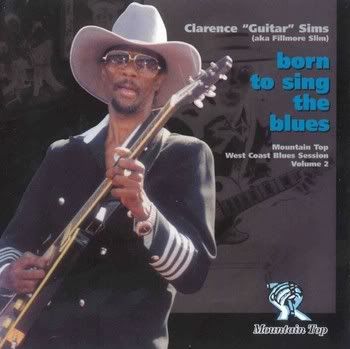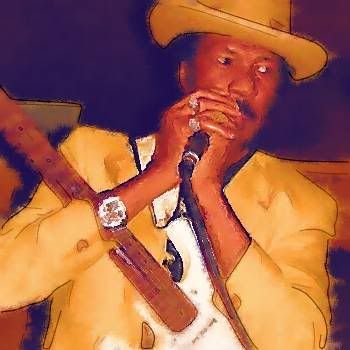
Clarence 'Guitar' Sims - Born To Sing The Blues - 2004 - Mountain Top
A firstclass showcase for the uncompromising guitarist ... a load of steaming blues spotlighting Clarence 'Guitar' Sims (Fillmore Slim) intense, high-pitched vocals and slicing, stinging lead guitar (sporting tinges of Johnny 'Guitar' Watson, Guitar Slim, and the ever popular B.B. and Albert King). Originally recorded in 1987 at the Eli Mile High Club in Oakland, California, this CD is a reissue of the original 1987 LP 'Born To Sing The Blues' originally on the Eli Mile High Records label. It stands as a West Coast blues classic. © Bill Dahl, Living Blues
Great blues from a man who has really lived the blues. Check out the artist info. His "Other Side Of The Road" album is another good album, and worth listening to, as Fillmore Slim is one of the last remaining musicians of San Francisco's early blues legacy.
TRACKS
01. Minding My Own Business 2:25
02. King Boy 6:13
03. Better Man 1 3:42
04. When I Come Home 4:23
05. Watchdog 4:23
06. 3rd Rate Love Affair 4:09
07. Send Her Home 4:12
08. Broke Baby 6:02
09. Lonely Heart and Broken Mind 4:24
10. So Much Trouble 4:54
11. Body Language 4:11
12. Things That I Used To Do 4:07
13. Sims Boogie 3:10
14. Better Man 2 3:07
15. Interview: Clarence 'Guitar' Sims 6:55
MUSICIANS
Clarence 'Guitar' Sims - Guitar & Vocals
Carl 'Good Rockin' Robinson - Guitar
Mark Naftalin - Piano
Ted Butler - Bass
Charles Banks - Bass
Chris daniels - Drums
Dave Wellhausen - Harmonica
Carl Green - Alto Sax
Bobby Webb - Tenor Sax
Bobby Spencer - Tenor Sax
Bernard Anderson - Baritone Sax
Recorded in Oakland, Ca. 1987;
Produced by Troyce Key
© 2004 Mountain Top Productions

ABOUT CLARENCE "GUITAR" SIMS
"Embracing the Blues." Former pimp Fillmore Slim puts the fast life behind him, moves forward with his music." The bluesman took the Greyhound into town. His rickety old van was in the shop, so he took the 'hound down from Sacramento, where he had been living for the past few months with his wife and four of his children. As he walked through the streets of downtown San Francisco, old friends who hadn't seen him in years greeted him as if it had been only a few days. A young woman, all smiles, sidled up to him as he ate his lunch in a diner. ``When I was a little girl,'' she said proudly, ``he was the biggest pimp in the city.'' Fillmore Slim is enjoying a certain renewed celebrity because of his former profession, thanks to his central role in the Hughes brothers' popular documentary film ``American Pimp,'' in which Slim speaks for the old school of his ancient calling. But Slim is out of that life now. He has returned to his first love -- music -- and has managed to scratch out a little place for himself in the world of contemporary blues. He appears next weekend at the 28th annual San Francisco Blues Festival. ``I was a blues singer when I was in the fast life,'' he said, ``but I didn't have time.'' Today he is sporting a well-worn sweatshirt and baseball cap, but back in his heyday, Slim cut a mighty figure -- decked out in sharkskin suits, alligator shoes and diamond watches, cruising down Fillmore Street behind the wheel of a new Cadillac. He had money. He knew people. He was a ghetto dignitary, colleague of the high and mighty and the down and out. He remembered Etta James from when she was just a juvenile delinquent in the neighborhood. He used to sing onstage with a young radio disc jockey who called himself Sly Stone. His lawyer was a young up-and-comer with vague thoughts of a career in politics named Willie Brown. As a young man, Slim cut a few 45 rpm records -- ``You Got the Nerve of a Brass Monkey'' was the best known -- and lingered around the peripheries of the Los Angeles R&B scene. He played an extended engagement in Anchorage, Alaska, with T-Bone Walker, and the blues guitar great showed the young singer a few licks. But the lure of easy money was too much. Slim left music behind as he fell in with the fast crowd and came to know women of less than perfect virtue. He's been arrested more times than he can remember. He has 15 children with five or six women (``I can't keep it straight,'' he said). He's traveled life's lonesome highway, paying his dues, taking his lumps, without complaint. The law finally took him down in 1980, after he was caught buying a forged passport. He had wanted to go to France to accept an offer to perform there, but couldn't legally leave the country because he was already on probation. Slim was sent to federal penitentiaries, where he served four years of a five-year sentence. In prison, he honed his guitar skills, and on his release, he found himself living in a halfway house not far from Eli's Mile Hi Club, Oakland's last authentic blues joint. Club owner Troyce Key, who once recorded with rock 'n' roller Eddie Cochran, took a shine to Slim -- who was using his real name with the felicitous addition of a nickname, Clarence ``Guitar'' Sims -- and cut Slim's first album, ``Born to Sing the Blues,'' in 1985. It has been rereleased on Mountaintop Records. His latest CD, ``Other Side of the Road'' on Fedora Records, was produced by Chris Millar, kingpin of the Fresno blues scene. It features members of his regular band, the Blue Mirrors; pianist J.J. Malone, himself an Oakland R&B veteran (``It's a Shame'') and guitarist Paris Slim. His records crackle with a grizzled authenticity, and Slim can turn out a blues line or two: ``I got a black cat/ I just can't get no tail.'' Few bluesmen on the scene these days can recall the golden age of the Fillmore, the glories of the Primalon Ballroom, Trees Pool Hall, Jimbo's Bop City. But Slim was there. He has worried that his sordid past -- ``my colorful life,'' he calls it -- will hold him back in the music field, but then likens himself to Chuck Berry and Johnny Cash, a couple of American music greats who didn't let a little jail time stand in the way of their careers. Anyway, singing blues is not exactly like a career in politics; doing time almost qualifies as a bluesman's pedigree. ``I have had the blues all my life,'' Slim said. ``I open my mouth, the blues comes out. I ate the blues. I slept the blues. If anybody's had the blues, I've had the blues.'' © Joel Selvin, Chronicle Pop Music Editor, Sunday, September 17, 0, © 2008 Hearst Communications Inc, www.sfgate.com/cgi-bin/article.cgi?file=/chronicle/archive/2000/09/17/PK79457.DTL&type=music
MORE ABOUT THE ARTIST
Fillmore Slim got his name from the years he performed in and around the clubs of the old Fillmore district in San Francisco in the late 1950s. In the late 1940s and '50s, Fillmore Street was the center of black entertainment and culture in San Francisco. The street held clothing stores, barbershops, pharmacies, record shops, grocery stores, banks, hotels and nightclubs. Many of the top entertainers made stops there and the scene flourished well into the 1960s, until it fell to redevelopment, which tore out the heart of the City's thriving black community. Fillmore Slim (aka Clarence Sims) was born in New Orleans and spent some childhood years in the Mississippi Delta. As a young child he often sang on city sidewalks for tips. His dream of becoming an entertainer took him to Los Angeles in 1955, where he established himself as an up-and-coming singer at the famed Moore's Swing Club. Falling under the influence of Big Joe Turner, Lloyd Price and Nappy Brown, he was impressive enough to be hired on the tour with Little Willie John, Harmonica Slim (aka Elmon Mickel TV Slim), and Joe Tex, who was just starting out. Not long after he formed his first band, Eddy N and the Blues Slayers, who held down the weekends at the Hole in the Wall in south central Los Angeles. He also dated Etta James during this time. In 1957 Slim moved to San Francisco and began making the rounds, performing at Tree's Pool Hall, the Blue Mirror and the Bella Plaza, where he shared the spotlight with a young Flip Wilson. During this time he came under the influence of the Texas-born guitarist L.C. 'Good Rockin' Robinson. The great San Francisco R&B impresario, Charles Sullivan, who ran things at the Fillmore Auditorium, booked him to open for B.B. King and Dinah Washington. Years later, Sullivan was murdered gangland style and the Fillmore eventually fell into the hands of Bill Graham. In 1959 Slim cut his first single for Bootie Williams' Dooto label. He followed that with a handful of other singles for Kent/RPM and Dore Records, where his release "Family Man"was in response to Ernie K. Doe's "Mother in Law." He also sat in with Roland Kirk, Groove Holmes and the Ike & Tina Turner Revue. Fillmore Slim even worked Alaska with the great T-Bone Walker, and at Pepper's in Chicago. He also befriended a young Rick Estrin when the harmonica player was a mere teenager. He made his first appearance at the San Francisco Blues Festival in the 1980s, while recording an album for Troyce Key's Eli Mile High label. The album has since been re-issued as a CD on Mountain Top Records. A second CD, "It's Gonna Be My Time Now," was released on Uptown. Another CD, "Other Side Of The Road," was released on Fedora and several other CDs have been released since then. Fillmore Slim is one of the few remaining figures of San Francisco's early blues legacy. Others include Sugar Pie DeSanto, Saunders King, Jimmy McCracklin, Earl Brown, Johnny Otis, Etta James and Bobby Webb. He has toured Switzerland, Germany and France, to great acclaim.





4 comments:
arghhh... !!! I am in late, link is dead. Could you re-up please ?
Hi, Anonymous. Don't despair! Try
http://rapidshare.com
/files/204226424/2004_Clarence__Guitar__Sims_-_Born_To_Sing_The_Blues.rar
Please check back, & thanks
Hi, is there any chance for a re up for Clarenc Sims Sings The Blues
THANK YOU
gds
Hi,gds. Sorry I can't re-up. My hard drive with the original album and 1,000's of others was nicked! Maybe somebody reading this could help....Thanks
Post a Comment